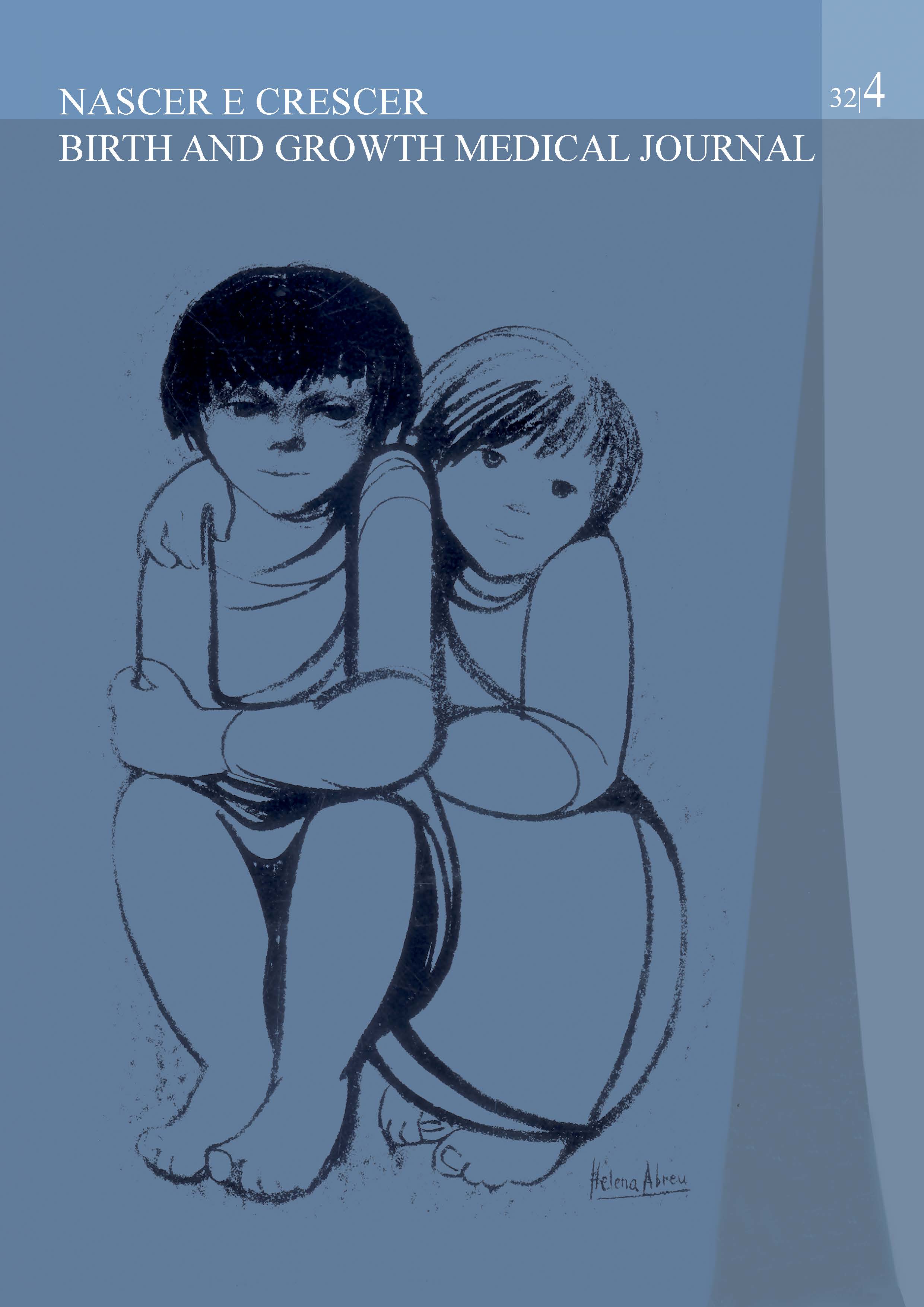The impact of the COVID-19 pandemic on adolescent Emergency Department visits
DOI:
https://doi.org/10.25753/BirthGrowthMJ.v32.i4.30423Keywords:
adolescence, COVID-19, health, mentalAbstract
Introduction: Adolescence is a unique period of physical and emotional growth. During the COVID-19 pandemic, several countries decided to close schools, with yet unclear consequences for mental health. Stressful life events may affect adolescents’ quality of life and precipitate psychiatric emergencies. This study aimed to compare the reasons for Emergency Department (ED) visits among adolescents before the COVID-19 pandemic and after the relief of social distancing measures.
Methods: A retrospective cohort study was conducted, including individuals aged 13-18 years admitted to the ED of a Portuguese level II hospital between January and June 2019 (Group 1) and January and June 2022 (Group 2). Data were collected from electronic medical records. Descriptive and inferential statistical analyses were performed.
Results: A total of 5135 adolescents were included in the two groups, with no demographic differences between them. Infectious diseases were the most common diagnosis overall. Group 2 showed a significant increase in mental health conditions such as anxiety (odds ratio [OR] 1.354) and feeding or eating disorders (OR 12.380), and its population was generally younger, especially in the feeding or eating disorders and intentional self-harm subgroups. No differences were found between groups regarding preexisting mental health conditions, except for intentional self-harm due to exposure to harmful substance effects, which were significantly more common in Group 2 (OR 4.267).
Conclusions: Although acute infectious diseases remain the most common cause of ED admissions, this study showed a significant increase in ED visits for mental health disorders, reflecting the impact of the COVID-19 pandemic. Protecting adolescents from adversity, promoting psychological well-being, and ensuring access to mental health care are critical to adolescent health.
Downloads
References
Censos 2021, Instituto Nacional de Estatística. Available at https://censos.ine.pt/xportal/xmain?xpgid=censos21_dados_finais&xpid=CENSOS21&xlang=pt [accessed 21.12.22].
Adolescent mental health, World Health Organization (WHO), 2021. Available at https://www.who.int/news-room/fact-sheets/detail/adolescent-mental-health [accessed 07.11.22].
Institute of Health Metrics and Evaluation. Global Health Data Exchange (GHDx). Available at https://ghdx.healthdata.org/ [accessed 07.11.22].
Arwan, A, Bayan, A, Syam, S, et al. Adolescent Mental Health During Stay at Home of The Covid-19 Pandemic. Journal of Health and Nutrition Research. 2022; 1(2): 82–7. DOI: https://doi.org/10.1016/j.ajp.2022.103309.
Diário da República Electrónico (DRE), Legislação COVID-19. Available at https://dre.pt/dre/geral/legislacao-covid-19 [accessed 21.12.22].
Loades ME, Chatburn E, Higson-Sweeney N, et al. Rapid Systematic Review: The Impact of Social Isolation and Loneliness on the Mental Health of Children and Adolescents in the Context of COVID-19. J Am Acad Child Adolesc Psychiatry. 2020;59(11):1218-39.e3. DOI: https://doi.org/10.1016/j.jaac.2020.05.009.
Guessoum SB, Lachal J, Radjack R, et al. Adolescent psychiatric disorders during the COVID-19 pandemic and lockdown. Psychiatry Res. 2020;291:113264. DOI: https://doi.org/10.1016/j.psychres.2020.113264.
Choi KR, Martinez-Hollingsworth A, Mead M, Dappolonia MS. Adolescent Psychiatric Emergencies Precipitated by the COVID-19 Pandemic. J Psychosoc Nurs Ment Health Serv. 2021 Jul;59(7):17-21. DOI: https://doi.org/10.3928/02793695-20201203-05.
A Saúde dos Portugueses - Perspectiva 2015. DGS. 2015.
International Classification of Diseases, 11th revision (ICD-11). Available at https://icd.who.int/en [accessed 19.01.23]
Relatório do estudo HBSC 2022, A Saúde dos Adolescentes Portugueses em Contexto de Pandemia - Dados nacionais do estudo HBSC 2022.
Leeb RT, Bitsko RH, Radhakrishnan L, et al. Mental Health-Related Emergency Department Visits Among Children Aged <18 Years During the COVID-19 Pandemic - United States, January 1-October 17, 2020. MMWR Morb Mortal Wkly Rep. 2020;69(45):1675-80. DOI: https://doi.org/10.15585/mmwr.mm6945a3.
Erez G, Yakubovich S, Sadeh H, et al. Pediatric psychiatric emergency rooms during COVID-19: a multi-center study. BMC Psychiatry. 2022;22(1):828. DOI: https://doi.org/10.1186/s12888-022-04371-7.
Breaux R, Dvorsky MR, Marsh NP, et al. Prospective impact of COVID-19 on mental health functioning in adolescents with and without ADHD: protective role of emotion regulation abilities. J Child Psychol Psychiatry. 2021;62(9):1132-1139. DOI: https://doi.org/10.1111/jcpp.13382.
Davico C, Marcotulli D, Lux C, Calderoni D, et al. Impact of the COVID-19 Pandemic on Child and Adolescent Psychiatric Emergencies. J Clin Psychiatry. 2021. DOI: https://doi.org/10.4088/JCP.20m13467.
Chevance A, Gourion D, Hoertel N, et al. Assurer les soins aux patients souffrant de troubles psychiques en France pendant l’épidémie à SARS-CoV-2. L’Encéphale. 2020. DOI: https://doi.org/10.1016/j.encep.2020.03.001.
Fegert JM, Schulze UME. Covid-19 and its impact on child and adolescent psychiatry - a German and personal perspective. Irish Journal of Psychological Medicine. 2020:1–8. DOI: https://doi.org/10.1017/ipm.2020.43.
Coronavirus: Impact on young people with mental health needs. Youngminds. 2020, March.
Downloads
Published
How to Cite
Issue
Section
License
Copyright (c) 2024 Inês Aires Martins, Joana Carvalho Queirós, Sónia Lira, Maria do Céu Ribeiro

This work is licensed under a Creative Commons Attribution-NonCommercial 4.0 International License.
Copyright and Authors' Rights
All articles published in Nascer e Crescer - Birth and Growth Medical Journal are Open Access and comply with the requirements of funding agencies or academic institutions. For use by third parties, Nascer e Crescer - Birth and Growth Medical Journal adheres to the terms of the Creative Commons License "Attribution - Non-Commercial Use (CC-BY-NC)".
It is the author's responsibility to obtain permission to reproduce figures, tables, etc. from other publications.
Authors must submit a Conflict of Interest statement and an Authorship Form with the submission of the article. An e-mail will be sent to the corresponding author confirming receipt of the manuscript.
Authors are permitted to make their articles available in repositories at their home institutions, provided that they always indicate where the articles were published and adhere to the terms of the Creative Commons license.


